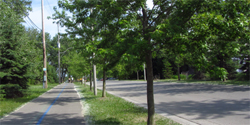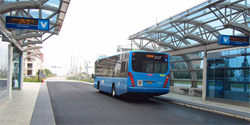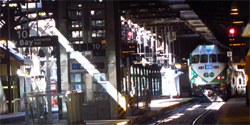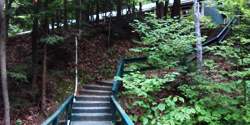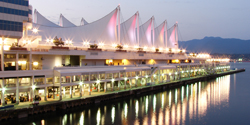|
Denny Yip is a third year undergraduate student at the University of Toronto, studying Civil Engineering (B.A.Sc.). His specific interests in civil engineering include the design of sustainable buildings, mass public transportation design, and city and urban development. work experience | design philosophy | interests He has worked in various public transportation posts, both under governmental positions. The first was under York Region Rapid Transit Corporation, working under the Senior Project Manager - Bus Rapid Transit, where he had the opportunity to see firsthand the development and design of complicated transit projects - the Spadina Subway Extension (north of Steeles Ave.) as well as the Highway 7 East and Davis Drive rapidways. Here it was easy to see how it is extremely easy to delay and derail large undertakings, or underuse or overuse funds. It also became clear the degree of technical knowledge utilised from a governmental agency's role in the design process, and the level of service which consultants provide in the overall process. His second transportation venture was under Metrolinx, in the Air Rail Link division. The Air Rail Link is a controversial project, constantly berated as 'unncessary', 'costly', or should be replaced with a regular commuter line. Under his position at ARL it became clear that in order to promote the City of Toronto to the world, it would be absolutely necessary to implement an express rail line directly from Pearson Intl. Airport to Union Station - a brisk 24 minute ride linking Toronto's busiest commuter hubs. Here his role was more interesting as it provided a deep look into industry best-practise in the start-up of a new system, something that is rare in the Greater Toronto Area. Every little factor must be taken care of. The intracompany co-operation is excellent at Metrolinx - wherever a process can be streamlined it will. A good or service should provide a net benefit, meeting as many desired outputs as possible (including the design one) while keeping the amount of undesired outputs to a minimum. Desired outputs should not segregate between social, environmental, or economical impacts - in the past, it is clear that the focus is placed on 1), the design goal, and 2) economic impact. The accumulation of capital quickly became the main goal for any good or service, and this has dismembered the human race from society and the environment. In the past, many goods or services have grossly misinterpreted the effects on society and the environment, while keeping economic return as the main driver for development. As time passed on, many more professionals, each specialised in their own domains of expertise (i.e. study focus areas, such as philosophy, engineering, etc.), have had solutions to a problem constricted to solutions within their own specialised knowledge. An engineer would have a different solution to a problem than a geologist. What this has led to is an infatuation with the 'end-of-pipe' methodology, where a problem is simply 'solved' by tacking another device capable of reducing this undesired output. An excellent example is building transportation systems to serve funneled traffic from poorly utilised land, when a much economically feasible, environmentally friendlier, and societal solution would be to simply build cities such that the need for transportation is minimised. Overall, the preventive approach, wherever applicable, is a much better solution. It is with experience, learning, and discussion that one learns the various factors that build a city. A city doesn't necessarily have to have a ginormous rapid transit system, linking everywhere with subways - it would be economically deathly with a landform like Toronto. Strict land use and the curb of sprawl facilitate the construction of a city in which people thrive economically, socially, and environmentally. For more details on the preventive approach, visit the centre for technology and social development. Unfortunately, as long as the the main focus for corporations is to accumulate the most capital rather than provide the best service to the roaming public, the preventive approach will continually be undermined until it is too late. An excellent example are oil companies. Outside of school and professional work, Denny is known to be an avid photographer with an emphasis on foliage and infrastructure. The philosophy behind this is the sheer contrast between nature and human manufacturing, showing the brutal change in design, societal development, and mark on the face of the Earth that we have created in a mere 200 years. Interest in visual arts are not only in photography, but graphic design as well, such as websites, maps, logos, etc. Like engineering, the product of graphic design must accurately portray the subject, while making it clear what the message is. Graphical communications is an important asset - if you cannot communicate what you want, you will hit bumps in the road. Another key interest is exercise and working out. A healthy mind is coupled with a healthy body - there cannot be one without the other. With exercise comes a general interest in sports (playing - not watching), such as basketball, table tennis, and dragonboat. A future interest lies in travelling the world, looking at how different societies function and how North American society can benefit and learn from our neighbours. Many of these societies have similar levels of population but are much more energy effiecient. He would also like to see for himself the marvels that lie on Earth, physically and culturally. He has been known to enjoy a good video game, Chinese and Japanese culture, good food, a good book (that's right - reading), and browse the Internet for current events in the world. At the University of Toronto, he is a part of the Chinese Engineering Students Association, frequently visits the Athletic Centre, and has provided graphic design services for the Engineering Society (F!rosh Week 2012) and University of Toronto Engineering Kompetitions (UTEK). Engineering interests include the design of good buildings (building science), public transportation development and appropriate service levels, project management and major capital investments. This webpage was built with Notepad under the guidance of w3schools. All photos on this page were also taken by Denny Yip. |
|
